词类的转换(英文)
词类的转换 handout
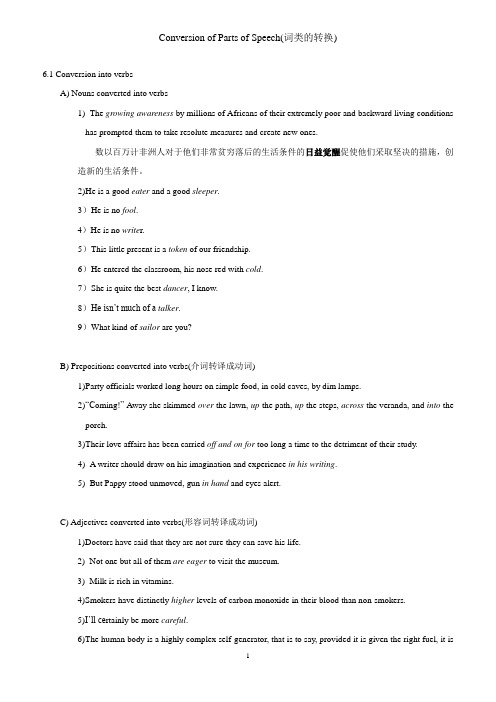
Conversion of Parts of Speech(词类的转换)6.1 Conversion into verbsA) Nouns converted into verbs1)The growing awareness by millions of Africans of their extremely poor and backward living conditionshas prompted them to take resolute measures and create new ones.数以百万计非洲人对于他们非常贫穷落后的生活条件的日益觉醒促使他们采取坚决的措施,创造新的生活条件。
2)H e is a good eater and a good sleeper.3)He is no fool.4)He is no write r.5)This little present is a token of our friendship.6)He entered the classroom, his nose red with cold.7)She is quite the best dancer, I know.8)He isn’t much of a talker.9)What kind of sailor are you?B) Prepositions converted into verbs(介词转译成动词)1)P arty officials worked long hours on simple food, in cold caves, by dim lamps.2)“C oming!” Away she skimmed over the lawn, up the path, up the steps, across the veranda, and into theporch.3)T heir love affairs has been carried off and on for too long a time to the detriment of their study.4)A writer should draw on his imagination and experience in his writing.5)But Pappy stood unmoved, gun in hand and eyes alert.C) Adjectives converted into verbs(形容词转译成动词)1)D octors have said that they are not sure they can save his life.2)Not one but all of them are eager to visit the museum.3)Milk is rich in vitamins.4)S mokers have distinctly higher levels of carbon monoxide in their blood than non-smokers.5)I’ll ce rtainly be more careful.6)T he human body is a highly complex self-generator, that is to say, provided it is given the right fuel, it iscapable of both curing and warding off disease.D) Adverbs converted into verbs(副词转译成动词)1)As he ran out,he forgot to have his shoes on.2)She opened the window to let fresh air in.3)You spoke as if you had been here before.4)The environment contains many potentially destructive microorganisms. It is impossible for us to avoid contact with microbes.E) Past participle converted into a verb(过去分词转译成动词)1)S till standing near the window was the bearded man---a gun in his hands.2)N owadays, many new products are in the “health” category, and the main focus is on reduced fat andcalorie content and increased dietary fibre.6.2 Conversion into nouns(转译成名词)A) Verbs that are derived from nouns(名词派生的动词)1)F ormality has always characterized their relationship.2)W hat does the rose symbolize? It symbolizes love.B) Verbs that are turned from nouns(名词转用的动词)1)A ir the room first and then dust the table and mop the floor.2)H is wife has done everything possible to mother him.6.3 Conversion into adjectives(转译成形容词)A) Nouns derived from adjectives can often be rendered into adjectives(形容词派生的名词往往可以转移成形容词)1)T he security and warmth of the destroyer’s si ck bay were wonderful.2)“Twenty years ago you were no beauty and time hasn’t done you any favors.”3) It is one of the world’s great novels, whose richness increases with each new reading.B) Some nouns with articles used as predicatives are often changed into adjectives in the Chinese version (有些名词加不定冠词作表语时,往往可以转译成形容词。
英语词性转换

英语词性转换英语中的词性转换是一种常见的语法现象,即同一个词在不同语境下可以属于不同的词性。
这种转换在英语中广泛存在,对于学习者来说,掌握词性转换是提高语言运用能力的重要一环。
1. 名词到动词的转换名词到动词的转换是常见的词性变化形式之一。
通过变换词尾或结构,一些名词可以转换成动词。
例如,“address”这个名词可以转换成“address”这个动词,表示处理或对付某事。
2. 动词到名词的转换动词到名词的转换同样是英语中常见的词性转换之一。
通过加上特定的后缀或改变词法,动词可以转变成名词的形式。
例如,“understand”这个动词可以转换成“understanding”这个名词,表示理解或理解能力。
3. 形容词到名词的转换形容词到名词的转换也是一种常见的词性变化。
通常通过加上后缀的方式,形容词可以转换成名词形式。
例如,“beautiful”这个形容词可以转换成“beauty”这个名词,表示美丽或美的概念。
4. 名词到形容词的转换名词到形容词的转换在英语中也经常见到。
通过添加特定的后缀或调整词法结构,名词可以转换成形容词的形式。
例如,“world”这个名词可以转换成“worldly”这个形容词,表示世俗的或世界的。
结语英语中的词性转换是语言学习中重要的一部分,掌握这种转换可以帮助学习者更准确地理解和运用英语。
通过不断练习和积累,学生们可以逐渐熟悉和有效运用这种词性转换,提高自己的语言表达能力。
希望本文提供的信息能够对读者有所帮助,让大家更好地掌握英语语言的精髓。
以上是关于英语词性转换的一些介绍,希望能够帮助到大家。
题目:人教版高中英语选修6重点动词词性转换

题目:人教版高中英语选修6重点动词词
性转换
本文档旨在总结人教版高中英语选修6中的重点动词及其词性转换规则。
以下是一些关键动词及其常见的词性转换方式:
1. arrange(安排)
- 动词形式:arrange
- 名词形式:arrangement
3. convert(转换)
- 动词形式:convert
- 名词形式:conversion
4. demonstrate(展示)
- 动词形式:demonstrate
- 名词形式:demonstration
5. express(表达)
- 动词形式:express
- 名词形式:expression
6. improve(改进)
- 动词形式:improve
- 名词形式:improvement
7. obtain(获得)
- 动词形式:obtain
- 名词形式:obtaining
8. observe(观察)
- 动词形式:observe
- 名词形式:observation
9. perform(执行)
- 动词形式:perform
- 名词形式:performance
10. transform(转换)
- 动词形式:transform
- 名词形式:transformation
请注意,动词的词性转换并不总是按照特定规则进行,部分动词可能存在特殊的变化形式。
因此,在研究和使用这些词汇时,最好结合具体语境和词法规则来判断并应用正确的词性转换方式。
以上是人教版高中英语选修6中的部分重点动词及其词性转换方式的总结,希望对您有所帮助。
翻译技巧4 措词、具体化、词类转换
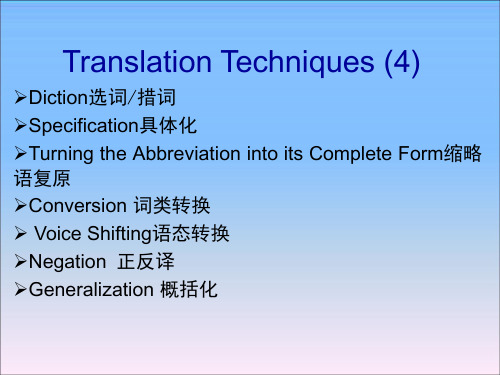
• 在西南地区广西、贵州、湖南、四川等省份,“吊脚楼”是 山乡少数民族如苗、侗、壮、布依、土家族等的传统民居样 式。尤其在黔东南,苗族、侗族的吊脚楼极为常见。这里的 自然条件号称“天无三日情,地无三里平”,于是山区先民 创造出了独特的“吊脚楼”。 • 吊脚楼依山而建,用当地盛产的杉木,搭建成两层楼的木构 架,柱子因坡就势长短不一地架立在坡上。房屋的下层不设 隔墙,里面作为猪、牛的畜棚或者堆放农具和杂物;上层住 人,分客堂和卧室,四周向外伸出挑廊,可供主人在廊里做 活和休息。廊柱大多不是落地的(便于廊下面的通行无碍), 起支撑作用的主要是楼板层挑出的若干横梁,廊柱辅助支撑, 使挑廊稳固地悬吊在半空,这种住宅因其外形和结构特点被 称为“吊脚楼”。吊脚楼的优点明显,人住楼上通风防潮, 又可防止野兽和毒蛇的侵害,这种住宅在西南山区至今仍有 建造。
• When a common word is turned into a proper noun, the meaning is narrowed accordingly such as the City, which means the “business centre of London”, the Peninsula, which refers to the “Iberian Peninsula”, and the Prophet, which stands for “Mohammed”.
(汉英翻译 词类的转换

3. 街中的一切逐渐消失在灰暗的暮色中。
Everything was gradually disappearing into a pall of grey.
练习 翻译下列句子。 1、中国成功地爆炸了第一颗原子弹,在全世
界引起了巨大的反响。 2、语言这个东西不是随便可以学好的,非下
苦功不可。 3、很难把这部小说列入哪一个类型中。 4、他酷爱古典音乐。 5、他们迫切地想弄到消息。
2).The U.S. will suffer most if it discontinues China’s most-favored-nation status.
3).Departments in charge of industry and commerce are authorized by the government to ban speculation and profiteering.
1. 朱延年用热情的款待把他的窘态遮盖过去。 Zhu Yannian covered up his embarrassment with the enthusiasm of his hospitality.
2.空气是这样的清香,使人胸脯感到分外凉爽、 舒畅。 The air was fresh and fragrant, it gave people a feeling of exceptional coolness and comfort.
3. 绝对不许违反这个原则。 No violation of this principle can be tolerated.
4. 林则徐认为,要成功地禁止鸦片买卖,就首 先得把鸦片焚毁了。 Lin Zexu believed that a successful ban of the opium trade must be proceeded by the destruction of the drug itself.
词类的转换

2.名词转译成形容词
This experiment was a success. 这个实验很成功。
3.名词转译成副词
I have the honor to inform you that your request is granted. 我荣幸地通知您,您的请求已得到批准。
二、动词的转译
At that time Copernicus was in the clear minority. 那时,哥白尼显然属于少数派。
TRANSLATION APPRECIATION
1. Bad workmen often blame their tools. 拙匠常怪工具差。 2. Show off one’s proficiency with the axe before Lu Ban the master carpenter. 班门弄斧。 3. Sow virtue, and the harvest will be virtue; sow vice, and the harvest will be vice. 善有善报,恶有恶报。 4. Speech is silver, silence is gold. 能言是银,沉默是金。 5. Step by step the ladder is ascended. 登梯需要逐级登。
1)由动词派生的名词转译成动词,在政论 文体中出现比较多
The government called for the establishment of more technical schools. 政府号召建立更多的技术学校。 Rockets have found application for the exploration of the universe. 火箭已经被用来探索宇宙。
Conversion词的转换译法

Conversion词的转换译法(1)大体可分为7 种:①词类转换(转性);②句子成分转换;③表达方式转换;④自然语序和倒装语序转换;⑤正面表达与反面表达转换;⑥主动语态与被动语态转换;⑦分句转换。
Converted into verb英语中的某些名词、介词、副词,翻译时可转译成汉语中的动词。
1. Noun-->verb一)英语中很多由名词派生的动词,以及由名词转用的动词,在汉语中往往不易找到相应的动词,这时可将其转译成汉语名词。
1. 名词派生的动词1)Formality has always characterized their relationship.他们之间的关系,有一个特点,就是以礼相待。
2)To them, he personified the absolute power.在他们看来,他就是绝对权威的化身。
2. 名词转用的动词1)Most U.S. spy satellites are designed to burn up in the earth's atmosphere after completing their missions.美国绝大多数间谍卫星,按其设计,是在完成使命后,在大气层中焚毁。
2)The lack of any special excretory system is explained in a similar way.植物没有专门的排泄系统,可用同样的方式加以说明。
3)As he ran out, he forgot to have his shoes on.他跑出去时,忘记了穿鞋子。
Practice1.My admiration for him grows more and more.我对他越来越钦佩了。
2.An acquaintance of world history is helpful to the studies of current affairs.了解世界历史对研究时事很有帮助。
初中汉译英词类转译法的例子
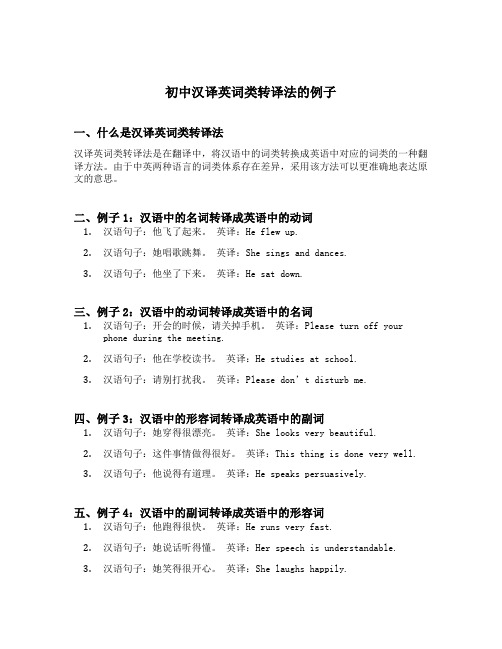
初中汉译英词类转译法的例子一、什么是汉译英词类转译法汉译英词类转译法是在翻译中,将汉语中的词类转换成英语中对应的词类的一种翻译方法。
由于中英两种语言的词类体系存在差异,采用该方法可以更准确地表达原文的意思。
二、例子1:汉语中的名词转译成英语中的动词1.汉语句子:他飞了起来。
英译:He flew up.2.汉语句子:她唱歌跳舞。
英译:She sings and dances.3.汉语句子:他坐了下来。
英译:He sat down.三、例子2:汉语中的动词转译成英语中的名词1.汉语句子:开会的时候,请关掉手机。
英译:Please turn off yourphone during the meeting.2.汉语句子:他在学校读书。
英译:He studies at school.3.汉语句子:请别打扰我。
英译:Please don’t disturb me.四、例子3:汉语中的形容词转译成英语中的副词1.汉语句子:她穿得很漂亮。
英译:She looks very beautiful.2.汉语句子:这件事情做得很好。
英译:This thing is done very well.3.汉语句子:他说得有道理。
英译:He speaks persuasively.五、例子4:汉语中的副词转译成英语中的形容词1.汉语句子:他跑得很快。
英译:He runs very fast.2.汉语句子:她说话听得懂。
英译:Her speech is understandable.3.汉语句子:她笑得很开心。
英译:She laughs happily.六、例子5:汉语中的数词转译成英语中的名词或形容词1.汉语句子:他过了六十岁生日。
英译:He had his 60th birthday.2.汉语句子:我买了十本书。
英译:I bought ten books.3.汉语句子:那个村庄有一千多人。
英译:There are over a thousandpeople in that village.七、例子6:汉语中的量词转译成英语中的of短语1.汉语句子:一杯咖啡英译:a cup of coffee2.汉语句子:一把椅子英译:a chair3.汉语句子:一条狗英译:a dog八、总结汉译英词类转译法是一种有效的翻译方法,特别适用于将中文翻译成英文时,准确表达原文意思。
9-词类转化.ppt
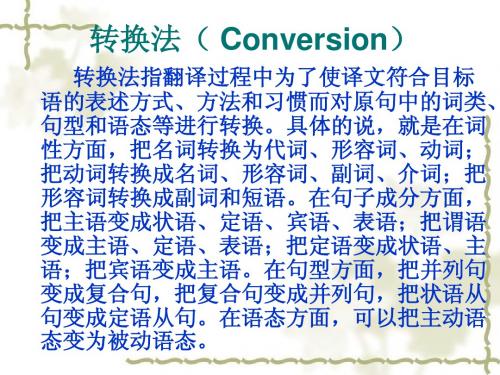
4. Adverbs into verbs
1)
Our holiday is three weeks away. 离我们的假期还有3个星期。 2) When will he be back? 他什么时候回来? 3) The boy told me that his mother was out. 那个男孩告诉我他的母亲出去了。
D.
I call for cooperation in the economic and technical sectors among the countries the world over.
4 )由动词 +er 构成的名词可以
转换成动词 You have been a real helper to me during my first college year. B. Some of my classmates are good singers.
有些副词是由形容词派生出来的,可转
译为形容词。 1) They were deeply impressed by what he did in the critical moment. 他在关键时刻的行为给他们留下了深刻 的印象。 2) Boys think differently from girls. 男孩子的思维方式和女孩子是不同的。
转换法( Conversion)
转换法指翻译过程中为了使译文符合目标 语的表述方式、方法和习惯而对原句中的词类、 句型和语态等进行转换。具体的说,就是在词 性方面,把名词转换为代词、形容词、动词; 把动词转换成名词、形容词、副词、介词;把 形容词转换成副词和短语。在句子成分方面, 把主语变成状语、定语、宾语、表语;把谓语 变成主语、定语、表语;把定语变成状语、主 语;把宾语变成主语。在句型方面,把并列句 变成复合句,把复合句变成并列句,把状语从 句变成定语从句。在语态方面,可以把主动语 态变为被动语态。
句子翻译一:词类转换(2)

example
• The new mayor earned some appreciation by the courtesy of coming to visit the city poor. • 新市长有礼貌地前来访问城市贫 民,获得了他们的一些好感。
• 名词转译成形容词
• This issue is of vital importance. • 这个问题至关 重要的. • The pallor of her face indicated clearly how she was feeling at the moment. • 她的苍白的脸色清楚地表明她此时 的情绪.
example
1967年联合国文件要求在以色列撤出所占 的土地以及阿拉伯承认以色列的生存权 利的基础上来解决中东冲突。
example
• 2.The sight and sound of our jet planes filled me with special longing. • 看到我们的喷气式飞机,听见隆隆的 机声,令我特别神往。含有动作意味 的名词(在记叙、描写文体中出现较 多)往往可以转译成动词。
example
• • • • • This is sheer nonsense. 完全 Buckley was in a clear minority. 显然
example
• We must make full use of exiting technical equipment.
形容词转译成名词
名词转换 1.名词转译成动词 2.名词转译成副词 3.名词转译成形容词
1. 名词转译成动词
英汉词语特点
• 汉语中动词用得比较多,这是一个
特点,往往在英语句子中只用一个谓
英语转化法的中文例子

英语转化法的中文例子
1、change的用法:change作改变,变化的意思时是可数名词。
change作。
转换的英文是change。
change作动词时意为“改变,转变,(使)不同;(使)变换;替代,更换;交换;货币兑换;将换成零钱;退还”,作名词时意为“变化,改变;替代物;换洗衣物;零钱,硬币;换乘;全新体验;新月相。
英语单词转化法一个单词有一种词类用作另一种词类的方法称
为转化法.如:back一词,能转换成很多词类,如:back n.后面,v.支持,a.后面的,过期的,adv.回来,恢复等.由于词类的转化,其词义产
生变化,在做词汇题或是在理解。
1、Google翻译Google翻译在界面上还是遵循了非常极简的谷歌风格,整体看起来和普通的翻译软件似乎也没有什么差别。
但是Google翻译还是有一点特色功能的,比如“实景翻译”。
英汉互译 第四章

25.该厂产品的主要特点
是工艺精湛,经久耐用。 The products of this factory are chiefly characterized by their fine workmanship and durability.
26.他在最后的一幕里
占了很突出的地位。 She figured prominently in the last act.
12.我国科学研究发展的特
点是理论联系实际。 13.我们觉得解决这个问题 并不难。 14.雄伟的人民大会堂给我 们留下了深刻的印象。 15.社会主义革命的目的是 为了解放生产力。
12.
The development of scientific research in our country is characterized by the combination of theory with practice. 13.We felt no difficulty in solving this problem.
获悉贵国遭受地震,我们 极为关切。 We are deeply concerned at the news that your country has been struck by an earthquake. 11. 她母亲为她的健康担忧。 Her mother was anxious about her health.
3.你必须好好地照顾病人。
You
must take good care of the patient. 4.他在讲话中特别强调提高 产品质量。 In his speech he laid special stress on raising the quality of the products.
英语单词词性转换方法法
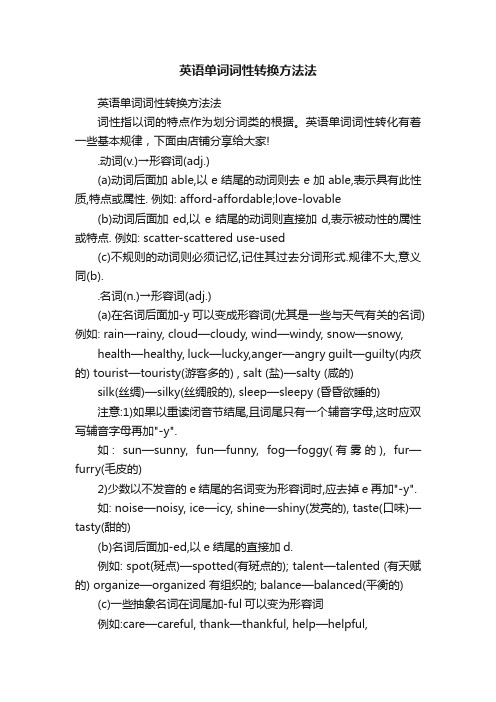
英语单词词性转换方法法英语单词词性转换方法法词性指以词的特点作为划分词类的根据。
英语单词词性转化有着一些基本规律,下面由店铺分享给大家!.动词(v.)→形容词(adj.)(a)动词后面加able,以e结尾的动词则去e加able,表示具有此性质,特点或属性. 例如: afford-affordable;love-lovable(b)动词后面加ed,以e结尾的动词则直接加d,表示被动性的属性或特点. 例如: scatter-scattered use-used(c)不规则的动词则必须记忆,记住其过去分词形式.规律不大,意义同(b)..名词(n.)→形容词(adj.)(a)在名词后面加-y可以变成形容词(尤其是一些与天气有关的名词) 例如: rain—rainy, cloud—cloudy, wind—windy, snow—snowy, health—healthy, luck—lucky,anger—angry guilt—guilty(内疚的) tourist—touristy(游客多的) , salt (盐)—salty (咸的)silk(丝绸)—silky(丝绸般的), sleep—sleepy (昏昏欲睡的)注意:1)如果以重读闭音节结尾,且词尾只有一个辅音字母,这时应双写辅音字母再加"-y".如: sun—sunny, fun—funny, fog—foggy(有雾的), fur—furry(毛皮的)2)少数以不发音的e结尾的名词变为形容词时,应去掉e再加"-y".如: noise—noisy, ice—icy, shine—shiny(发亮的), taste(口味)—tasty(甜的)(b)名词后面加-ed,以e结尾的直接加d.例如: spot(斑点)—spotted(有斑点的); talent—talented (有天赋的) organize—organized 有组织的; balance—balanced(平衡的)(c)一些抽象名词在词尾加-ful可以变为形容词例如:care—careful, thank—thankful, help—helpful,use—useful, meaning—meaningful(d)在名词后加-less构成含有否定意义的形容词例如:care—careless(粗心的), use—useless(无用的)hope—hopeless(没希望的),home—homeless(无家可归的)(e)一些以-ce结尾的名词,把-ce改为-t变成形容词例如: difference—different, silence—silent, confidence—confident(f).在名词后加-ly变为形容词例如: friend—friendly, love—lovely, live---lively(g).在名词后加-ous变为形容词例如: danger—dangerous(h)名词后面加-al变为形容词例如: music—musical; medicine—medical (这个比较特殊)(i)名词后面加-able变为形容词,如果以e结尾就去e再加"-able". 例如: adjust—adjustable 可调整的. value—valuable有价值的(j)名词后面加-en变成形容词例如: wood—wooden 木制的 wool—woolen 羊毛的.动词(v.)→名词(n.)(a)词形不变,词性改变例如:work, study, water, plant等可以用作动词(工作,学习,浇水,种植),也可以用作名词(工作,学习,水,植物).(b)一些动词在词尾加上-er或-or之后就变成了表示"某一类人"的名词例如:work—worker, teach—teacher, sing—singer,jump—jumper, play—player, learn—learner,visit—visitor, invent—inventor,collect—collector等.注意:1)以不发音的e结尾的动词,在词尾加-r.例如:drive—driver, write—writer等.2)以重读闭音节结尾,且末尾只有一个辅音字母的动词,应双写末尾的辅音字母,再加-er例如:run—runner, win—winner,begin—beginner等.(c)在动词词尾加上-ment 变成名词例如:achieve—achievement (成就)advertise—advertisement//advertising(广告)agree—agreement disgree—disagreementamuse—amusement (娱乐) improve—improvement(争吵)commit(奉献)—commitment develop—development (发展) depart—department (局,部) govern(统治)—government(政府) manage—management (管理) equip—equipment (装备)有些单词比较特殊,需把动词后的e去掉再加ment.例如:argue—argument(争论)(d)在动词词尾加上-(t)ion/(s)ion变成名词例如: attract—attraction; instruct—instruction;invent—invention discuss—discussion;express—expression educate—education;graduate—graduation; operate—operation (去e再加"ion") compete—competition; organize—organization (把e改成其他字母再加"tion") decide—decision conclude—conclusion (把de 改为s再加"ion")describe—description描写,描绘 (这是特例,不规则变化)(e)在动词词尾加上-ance变成名词例如: appear—appearance (外貌;出现)perform—performance (演出)accept—acceptance (接受)(f)在动词词尾加-ing变成名词 (方法与动词变为现在分词的方法相同)例如:meet—meeting build—building wait—waiting bathe—bathing say—saying(谚语) mean—meaningend —ending train —training wash—washing 注意:以重读闭音节结尾,且末尾只有一个辅音字母的动词,应双写末尾的辅音字母,再加-ing如:swim—swimming shop—shopping begin—beginning(g)其他一些比较特殊的变化例如: Beg(乞讨)—beggar(乞丐) behave(行为举止)—behavior know(知道)—knowledge(知识) fly—flight (飞行)heat (加热)—heat(热量) hit (撞击)—hit( 轰动一时的人或物,碰撞) mix (混合)—mixture(混合物) press(按,压)—pressure(压力) sit(坐)—seat (座位) succeed—success(成功)tour—tour(旅游)/ tourist (游客)形容词→副词一般在形容词的词尾加-ly可以变成副词。
词类的转换

• 9. Wine soon oiled the hinges of the talk. • 10. It is easy to see why the dramatic changes have fired the world’s imagination
key
• II. Translate the following into Chinese: • 1. Age has clouded his memory, and drink has clouded his thinking. • 他上了年纪,记性不好,喝了酒就更不能 清晰地思考了。 • 2.His career in the army was sidetracked by a shoulder injury. • 因肩部受伤,他没有能继续部队生涯。
• • • • • • •
3.He was schooled by life itself. 他是从生活中学会这一切的。 4.The special sound box is fashioned out of a whole coconut shell。 这个八音盒是用一个完整的椰子壳做成的。 5. John low-keyed the topic as usual. 和平时一样,月航对这个问题也是低调处 理。
• We are enemies of all wars, but above all of dynastic wars. • • 我们反对一切战争,特别是 王朝战争。
• Talking with his son, the old man was the forgiver of the young man’s past wrong doings. • 在和儿子谈话时,老人宽恕了 年青人过去所干的坏事。
英译汉中的词类转换研究共3篇
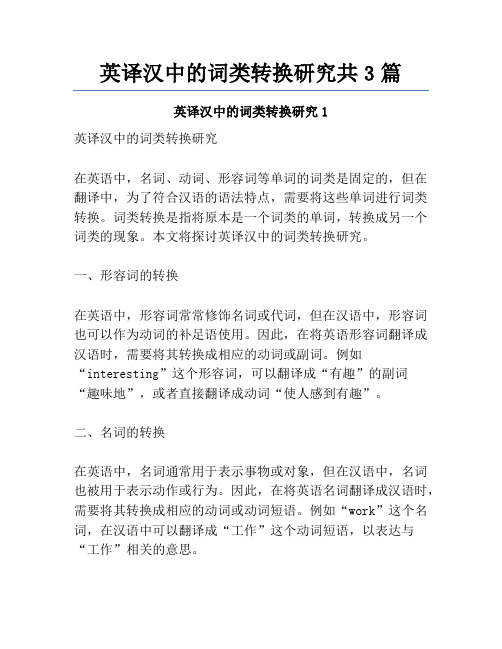
英译汉中的词类转换研究共3篇英译汉中的词类转换研究1英译汉中的词类转换研究在英语中,名词、动词、形容词等单词的词类是固定的,但在翻译中,为了符合汉语的语法特点,需要将这些单词进行词类转换。
词类转换是指将原本是一个词类的单词,转换成另一个词类的现象。
本文将探讨英译汉中的词类转换研究。
一、形容词的转换在英语中,形容词常常修饰名词或代词,但在汉语中,形容词也可以作为动词的补足语使用。
因此,在将英语形容词翻译成汉语时,需要将其转换成相应的动词或副词。
例如“interesting”这个形容词,可以翻译成“有趣”的副词“趣味地”,或者直接翻译成动词“使人感到有趣”。
二、名词的转换在英语中,名词通常用于表示事物或对象,但在汉语中,名词也被用于表示动作或行为。
因此,在将英语名词翻译成汉语时,需要将其转换成相应的动词或动词短语。
例如“work”这个名词,在汉语中可以翻译成“工作”这个动词短语,以表达与“工作”相关的意思。
三、动词的转换在英语中,动词具有明确的时态和语态,但在汉语中,动词的时态和语态是通过词语的变化来体现的。
因此,在将英语动词翻译成汉语时,需要将其转换成相应的汉语动词形式或句型。
例如,“run”这个动词可以翻译成“跑”、“奔跑”或者“奔跑着”的汉语动词形式。
四、副词的转换在英语中,副词通常用于修饰动词、形容词或其他副词,但在汉语中,副词也可以作为状语放在句首或句中,以表示主语的状态或情感。
因此,在将英语副词翻译成汉语时,需要将其转换成相应的汉语状语,以便能够翻译成汉语句子。
例如“quickly”这个副词可以翻译成“迅速地”、“飞快地”等状语。
五、形容词和名词的转换在英语中,形容词和名词之间有时可以互相转换,例如“happy”这个形容词可以转换成“happiness”这个名词。
在汉语中,类似的转换也可以发生。
例如“美好”、“幸福”等名词可以转化成形容词,以便更好地表达语言的表现力。
总之,英译汉中的词类转换是为了适应汉语的语法规则和表达方式。
英汉互译理论与实务课件及其参考答案 第三章第三节 词性转换

2.2 英语动词、形容词和副词与汉语名词相互转换
(1)英语动词≈汉语名词
例1:屋子真温暖,回家的感觉真好。 译文:The house is really warm and feels good. 例2:Outstanding educational employees should be properly acclaimed and rewarded. 译文:对于表现优秀的员工,应该适当地予以表扬和奖励。
例30:Learning is wealth to the poor, an honour to the rich, an aid to the young, and a support and comfort to the aged. 译文:学问是穷人的财富,是富人的荣誉,是青年的帮助,是老年的支 持和安慰。
例5:他的言论在报纸上受到抨击。 译文:His remarks were attacked in the newspaper.
可见,能与汉语动词相互转换的英语动词有如下特征:
a. 一些由名词派生或转用的英语动词(如apologize,
identify, personify, symbolize等);
(3)英语副词≈汉语形容词
英语动词译成汉语名词时,修饰动词的英语副词往往要转 译成汉语的形容词,反之亦然。
例1:I suppose boys think differently from girls. 译文:我想男孩子的思维方式与女孩子是不一样的。
例2:《唐山大地震》23秒的地震再现,给观众们留下了深刻的 印象。 译文:Many audiences are deeply impressed by the 23second reproduction of earthquake in the movie Aftershock.
词的翻译2

3. with/without 的用法
• 1. With a rifle across his shoulder, the boy was playing the soldier. • 那男孩肩上扛着枪在装士兵。 • with a rifle across his shoulder 这一介词短 语被译成了动词短语“肩上扛着枪”。
其他词类转换
• • • • 1. 婚礼取消了。 The wedding was off.(动词装换为副词) 2. 他有口才,有风度,但很软弱。 He was eloquent, elegant but soft.(名词转换 为形容词) • 3. 他虽然身体很弱,但头脑正常。 • He is physically weak but mentally sound.(名 词转换为副词)
• 2. 你妈妈叫你马上回去。 Your mother wanted you back at once. (省略了“go”) • 3. 我们热烈欢迎你参加这次研讨会。 We warmly welcome you to the seminar. (比“welcome you to attend the seminar”要 地道一些)
• 2. 英语中动词加后缀的构成的名词,在汉语里 也多是由动词表示的。
• • • • • •
He is a good singer. 他歌唱得好。 Since he lost his job, he’s been a loner. 他失业以后就变得不合群了。 我晕船。 I am a poor sailor.
• • • • 他对这项工作仍然很生疏。 He is still a stranger to the work. 街道中的一切消失在灰暗的暮色里。 Everything was gradually disappearing into a pall of grey.
英译汉翻译技巧最新_例句

• 4.说明身份、称号的英语同位语往往放在专 门名词后面,汉译时一般放在前面。如: • They silently surrounded Tom, a young soldier, in order to take him prisoner. • 他们悄悄地包围了一个年轻战士汤姆,企 图俘虏他。
• (二)定语从句 • 1. 限定性定语从句 • 1)前置法:把英语限制性定语从句译成带 “的”定语词组,放在被修饰词之前,从 而将复合句译成汉语单句。如:
• Anyone who has not attended a large college football game has missed one of the most colorful aspects of American college life. • 任何一个没有参加过学校足球比赛的人, 都会错过大学生活中最为精彩的一面。
2.英语动词→汉语名词
• 有些动词在汉语里虽有相对应的动词词义, 但在某种特定的语言场合下不能使用该动 词词义,或由于需要选择另一种更好的译 文,因而将其转化为汉语的名词。如: • Judgment should be based on facts, not on hearsay. • 判断应该以事实为依据, 而不应该依道听 途说。
• 2. 非限制性定语从句对先行词不起限制作用,只 对它加以描写、叙述和解释。翻译这类从句时可 以运用以下几种方法: • 1)前置法:一些较短而具有描写性的英语非限制 性定语从句,也可以译成带“的”前置定语,放 在被修饰词前面。如: • He liked his sister ,who was warm and pleasant, but he did not like his brother, who was selfish and arrogant. • 他 喜欢热情愉快的妹妹,而不喜欢自私高傲的弟 弟。
翻译报告_英译汉
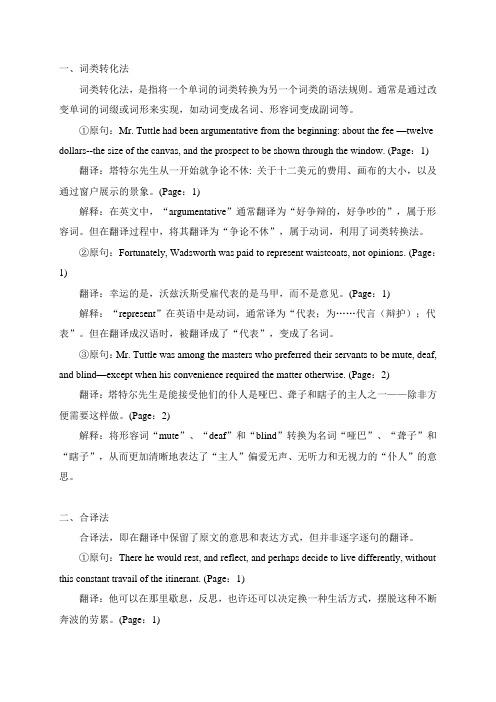
一、词类转化法词类转化法,是指将一个单词的词类转换为另一个词类的语法规则。
通常是通过改变单词的词缀或词形来实现,如动词变成名词、形容词变成副词等。
①原句:Mr. Tuttle had been argumentative from the beginning: about the fee —twelve dollars--the size of the canvas, and the prospect to be shown through the window. (Page:1) 翻译:塔特尔先生从一开始就争论不休: 关于十二美元的费用、画布的大小,以及通过窗户展示的景象。
(Page:1)解释:在英文中,“argumentative”通常翻译为“好争辩的,好争吵的”,属于形容词。
但在翻译过程中,将其翻译为“争论不休”,属于动词,利用了词类转换法。
②原句:Fortunately, Wadsworth was paid to represent waistcoats, not opinions. (Page:1)翻译:幸运的是,沃兹沃斯受雇代表的是马甲,而不是意见。
(Page:1)解释:“represent”在英语中是动词,通常译为“代表;为……代言(辩护);代表”。
但在翻译成汉语时,被翻译成了“代表”,变成了名词。
③原句:Mr. Tuttle was among the masters who preferred their servants to be mute, deaf, and blind—except when his convenience required the matter otherwise. (Page:2) 翻译:塔特尔先生是能接受他们的仆人是哑巴、聋子和瞎子的主人之一——除非方便需要这样做。
(Page:2)解释:将形容词“mute”、“deaf”和“blind”转换为名词“哑巴”、“聋子”和“瞎子”,从而更加清晰地表达了“主人”偏爱无声、无听力和无视力的“仆人”的意思。
- 1、下载文档前请自行甄别文档内容的完整性,平台不提供额外的编辑、内容补充、找答案等附加服务。
- 2、"仅部分预览"的文档,不可在线预览部分如存在完整性等问题,可反馈申请退款(可完整预览的文档不适用该条件!)。
- 3、如文档侵犯您的权益,请联系客服反馈,我们会尽快为您处理(人工客服工作时间:9:00-18:30)。
词类的转换
n—v
1.During the past few years, the city has shown a rapid increase in population.
2.We know that the mastery of a foreign language is not easy.
3.Their first sight of land came after three days at sea.
4.We left the baby in the care of our neighbor.
5.The appearance of the book on the market caused a sensation.
6.Her husband’s murder shook her faith in the legal system.
7.She is a lover of Chinese painting.
8.Example is the only thing in influencing others.
pre, ad, a—v
9.Papers must be in by Monday.
10.Our friends were over yesterday.
11.That day he was up before sunrise.
12.Are you for or against the plan?
13.He guided the man through the streets to the railway station.
14.He is after neither fame nor gain.
15.I pay 60 pence for the book.
16.He is over 70.
17.Plants cannot live without water and light.
18.She sang to the piano.
19.I’m ignorant of what has happened.
20.Chances of failure and disaster are ever present in all space navigation.
21.Are you aware that there is a difficulty?
22.We are more concerned with efficiency than expansion.
v—n
23.Within seconds the meter hand should read zero.
24.He was deeply impressed by what they did in the critical moment.
25.He has behaved shamefully towards his wife.
26.The electronic computer is chiefly characterized by its accurate and rapid
computations.
27.In the wedding ceremony, the rings symbolize the union of the two partners.
28.The paper is aimed at helping students fully understand the problem of
English-to-Chinese translation.
29.He impressed me deeply with his speech.
a—n the + a
30.He was sympathetic with the dying.
31.They did their best to help the sick and the wounded.
n—a
32.The new teacher is full of enthusiasm.
33.We are deeply convinced of the correctness of this policy and firmly determined
to pursue it.
34.The comfort and warmth of the house were wonderful.
35.He was a great success as an actor.
36.Independent thinking is an absolute necessity in study.
ad—a
37.He behaved badly to his wife.。
